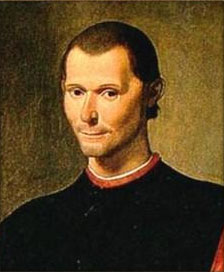Under the guidance of Voltaire, Frederick the Great of Prussia criticised Machiavelli’s conclusions in his “Anti-Machiavel”, published in 1740.
At different stages in his life, Napoleon I of France wrote extensive comments to The Prince. After his defeat at Waterloo, these comments were found in the emperor’s coach and taken by the Prussian military.
Italian dictator Benito Mussolini wrote a discourse on The Prince.
Soviet leader Joseph Stalin read The Prince and annotated his own copy.
In popular culture:
20th-century Italian-American mobsters often cite quotes from The Prince. John Gotti and Roy DeMeo would regularly quote The Prince and consider it to be the “Mafia Bible”.
Rapper Tupac Shakur read The Prince while in prison recovering from an attempt on his life. After he was released he used a pseudonym “Makaveli”, the name under which Death Row Records released The Don Killuminati: The 7 Day Theory.
Interpretations
Timeline of composition
There has been much debate of when Machiavelli actually composed The Prince (and his other works). Commentators have viewed this question to be of great importance, as some interpreters believe that Machiavelli changed his views between the composition of The Prince, and the composition of The Discourses. Hans Baron is one of such commentators who argued that Machiavelli must have changed his mind dramatically in favor of free republics, after having written The Prince. Harvey Mansfield and Nathan Tarcov, in the introduction to their translation of The Discourses on Livy, state that there are no discrepancies between The Prince and his later works, and that it “seems the safest” to see them “as a pair of works, not much different, if at all, in time of composition.” Scholar William Connell views that the composition and development of The Prince was a lengthy process with his ideas being revised from 1513 to 1515.
Other interpretations
Satire
This interpretation was famously put forth by scholar Garrett Mattingly (1958), who stated that “In some ways, Machiavelli’s little treatise was just like all the other ‘Mirrors of Princes’, in other ways it was a diabolical burlesque of all of them, like a political Black Mass.”
This position was taken up previously by some of the more prominent Enlightenment philosophes. Diderot speculated that it was a work designed not to mock, but to secretly expose corrupt princely rule. And in his The Social Contract, the French philosopher Jean-Jacques Rousseau said:
Machiavelli was a proper man and a good citizen; but, being attached to the court of the Medici, he could not help veiling his love of liberty in the midst of his country’s oppression. The choice of his detestable hero, Cesare Borgia, clearly enough shows his hidden aim; and the contradiction between the teaching of the Prince and that of the Discourses on Livy and the History of Florence shows that this profound political thinker has so far been studied only by superficial or corrupt readers. The Court of Rome sternly prohibited his book. I can well believe it; for it is that Court it most clearly portrays.
— Social Contract, Book 3, note to Chapter 6.
However, this line of interpretation is often refuted by those who study Machiavelli’s works. For example Isaiah Berlin states that he cannot find anything other than Machiavelli’s work that “reads less” like a satirical piece. Maurizio Viroli writes: “In my opinion, none of these defenses of Machiavelli is valid. The view that The Prince is the “book of Republicans” comes from Rousseau’s desire to rescue its author’s bad reputation and make The Prince consistent with the Discourses on Livy, the text in which Machiavelli developed a comprehensive republican theory of liberty and government” and added that the claim “misrepresents the meaning of the text.”
Deceit
Mary Dietz, in her essay “Trapping The Prince”, writes that Machiavelli’s agenda was not to be satirical, as Rousseau had argued, but instead was “offering carefully crafted advice (such as arming the people) designed to undo the ruler if taken seriously and followed.” By this account, the aim was to reestablish the republic in Florence. She focuses on three categories in which Machiavelli gives paradoxical advice:
He discourages liberality and favors deceit to guarantee support from the people. Yet Machiavelli is keenly aware of the fact that an earlier pro-republican coup had been thwarted by the people’s inaction that itself stemmed from the prince’s liberality.
He supports arming the people despite the fact that he knows the Florentines are decidedly pro-democratic and would oppose the prince.
He encourages the prince to live in the city he conquers. This opposes the Medici’s habitual policy of living outside the city. It also makes it easier for rebels or a civilian militia to attack and overthrow the prince.
According to Dietz, the trap never succeeded because Lorenzo – “a suspicious prince” – apparently never read the work of the “former republican.”
